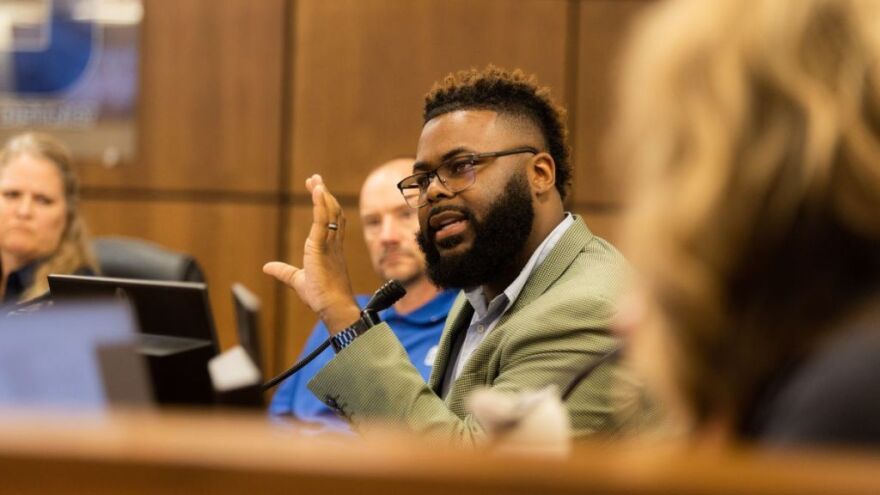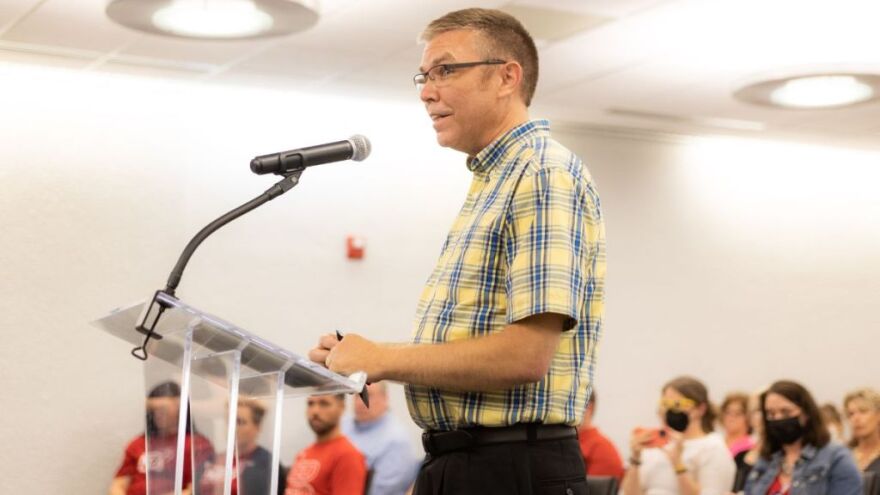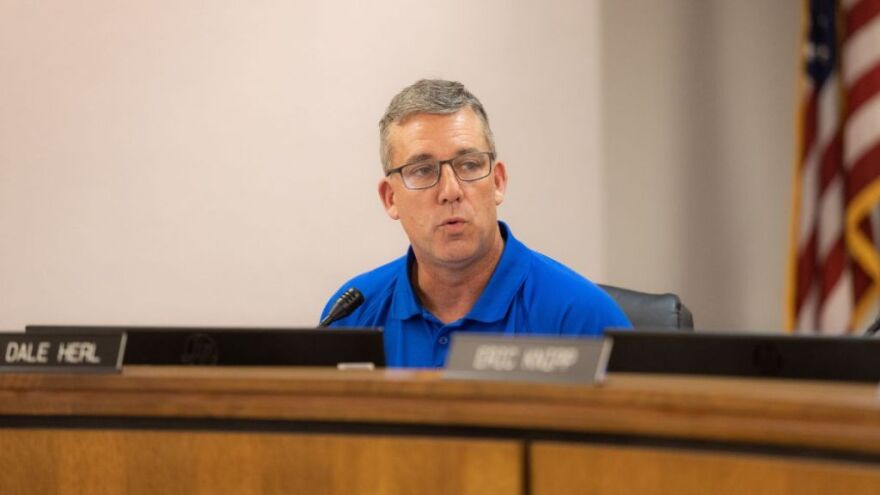Independence School District Superintendent Dale Herl said he typically starts answering emails at 4:15 a.m. His evening duties might wrap up after 10 p.m.
“That is one thing I have a talent for,” he said. “I can go on very little sleep.”
Starting July 1, Herl will have more free time, Independence will have an interim superintendent and the school board will be in the early stages of recruiting the district’s next permanent leader.
Herl has led the Independence district — which enrolls about 14,000 K-12 students — since 2013 after spending four years as the district’s deputy superintendent of operations and finance.
His decision to retire effective June 30 comes after his youngest child graduated from high school. Herl wants to spend more time with family, especially as some of his children compete in college or professional sports and after a health scare made him revisit his priorities.
Community members say Herl managed finances expertly, improved school buildings and sports facilities, and spearheaded innovations such as career and college-based academies and the four-day school week.
“We are not a wealthy community, and we rely considerably on having very, very strong public services and public education,” said Eileen Weir, Independence mayor from 2014 to 2022. “We’ve been fortunate that we have that.”
But some residents hope the next superintendent brings significant change. They want improved mental health services, more community engagement and attention to the needs of an increasingly diverse student body.
“We need somebody that’s open to doing something different and hearing everyone,” said Judy Young, a parent and Independence Council PTA president. “Genuinely hearing everyone.”
The board’s role
The school board’s superintendent search begins against a backdrop of lengthening discussions and more frequent disagreements during meetings. Previously, a Beacon analysis found board members unanimously agreed in public votes for at least 10 years.
In a January closed session, the school board narrowly voted to renew Herl’s superintendent contract through mid-2028. Carrie Dixon, Denise Fears, Jill Esry and Blake Roberson were in favor. Wendy Baird, Brandi Pruente and Anthony Mondaine voted against.
In March, the board unanimously agreed to raise Herl’s salary to nearly $304,000.
A unanimous vote in May allowed Herl to keep that salary — and benefits including health insurance, 35 vacation days and the use of a district-provided vehicle — for a year after his retirement as superintendent. He’ll serve as a full-time financial analyst, overseeing the budget, leading long-term financial planning and levy campaigns and mentoring staff, among other responsibilities.
No board members agreed to speak with The Beacon, but board President Carrie Dixon and longtime board member Blake Roberson sent statements praising Herl.
On July 1, deputy superintendent Cindy Grant will take the helm as the district’s interim superintendent. She’ll be paid her base salary of more than $225,000, plus an additional $30,000 for her interim superintendent duties.
Board members Baird and Pruente voted against the contract addendum naming Grant interim superintendent, while the other five board members voted in favor.
The board is reviewing proposals for superintendent search firms and will publicly discuss them at the July 8 board meeting, the district said in an emailed statement.

The district’s teachers union hopes the board picks a search firm that doesn’t have existing ties to the school district, such as employing a former superintendent or already providing other services, said Jorjana Pohlman, president of the Independence National Education Association.
‘He’s a math teacher’
Herl takes pride in how he’s managed the district’s finances and buildings.
During his time as superintendent, Herl said, the district passed three bond issues for building improvements and two tax levies to help increase employee salaries and benefits. He tried to transform buildings that might have otherwise sat vacant or underused.
Young, the PTA president, said the remodel of Crysler Stadium stands out.
“We painted it so when you go there, you feel like it’s Van Horn Stadium,” she said. “That’s a great example of using a resource the city wasn’t really using and wasn’t taking care of and turning it into something that the district could use.”
Ann Franklin, a longtime educator and former Independence school board member, said in an email that Herl’s grasp of Missouri’s complicated school finance system was particularly impressive.
“He was often called on by the superintendents’ organization to testify before legislators in Jefferson City because he understood and could explain the financial impact of legislation,” she said. “He was a very effective defender of public schools in Jefferson City.”
Herl sometimes got creative. His bio on the district website said he “has made it his mission to implement non-traditional ways of saving the district millions of dollars,” such as adding a health clinic for employees.
“He’s a math teacher, and numbers matter to him,” said Brent Schondelmeyer, a longtime resident who has stayed engaged with the district.
Schondelmeyer can remember a time when Independence schools closed for weeks because they ran out of money.
“When I reflect back on that — and that’s over 50 years ago — you just realize that the school district has (recently) been well managed and well run, and it’s financially sound,” he said. “But there’s more to a school district than its finances.”
Academics and innovation
Herl’s willingness to innovate extended beyond money management.
“He was known for thinking outside the box and coming up with creative solutions,” wrote Dixon, the board president.
Under his leadership, the district launched a system of career and college-based academies in Independence high schools. Franklin sees that as Herl’s standout achievement.
“School districts from all over the country visited ISD to learn about the academy program,” she wrote. “It was a major, complicated, and lengthy endeavor involving the business community and others, but Dr. Herl refused to give up.”
More recently, the district became by far the largest in Missouri to adopt a four-day school week, a change largely aimed at improving teacher retention and recruitment.
Herl has said the schedule increased teacher applications and Pohlman, the teachers union president, said teachers generally appreciate the new schedule.
But its future is uncertain because a new state law targeting Independence requires a public vote to continue it. The four-day week also drew a state audit of the district.
Herl also focused on academic excellence. Independence’s state performance scores have increased for the past three years. Herl particularly highlighted top marks in academic growth.
Herl “has a high bar of excellence,” said Merideth Rose, the current president and CEO of Cornerstones of Care, who led the district’s Family Services Department from 2015 to 2021. “He would say: ‘You don’t move the plate. You set a bar, you set a standard, and you do what you can to support youth and families to get to that bar.’”
Franklin, the former board member, wrote that Herl cared for children beyond his official duties.
Herl and his wife “took in numerous kids for one reason or another, often friends of their own children, providing them a home, structure, food, transportation, homework help, etc.,” she said. “To me, it demonstrated his sincere love for kids and his willingness to do anything possible to help them in any way possible.”
‘You get a shield’
When community members criticized Herl’s leadership, it was often related to how he responded to feedback or criticism.
Herl said it’s impossible to please everyone.
“Just because you don’t like the decision doesn’t mean it wasn’t considered or (was) dismissed,” he said. “They may not understand the full breadth and scope of the situation.”
Herl said he focused on “putting kids first.”
At times, “my biggest detractors wanted to focus on things that I thought (were) not about putting kids first,” he said. “It was about putting adults first, and that’s something I was never willing to do.”
He named financial negotiations, keeping schools open during the COVID-19 pandemic and refusing to hold remote learning during snow days as examples of sometimes-controversial ways he put kids first.
But for some, the district under Herl’s leadership seemed skeptical of any feedback.
Kate Beem, a longtime district resident and parent, said she formerly viewed the district as particularly open and collaborative.
But she thinks that has shifted over the last couple decades. Those who ask questions are seen as troublemakers rather than people trying to get involved.
Beem said she saw how the district viewed her when her employer reversed course on giving her a new position as a therapist based in an Independence school building.
The district wouldn’t sign an agreement with her organization if she were the therapist in the role, she heard, because she was perceived to have a negative relationship with the district. She’d been quoted in a 2017 story critical of former Superintendent Jim Hinson.
Herl told The Beacon he wasn’t aware of the incident Beem described, but thought she disliked him due to other decisions he’d made related to her family.
Young, the PTA president, said Herl wasn’t receptive when she suggested clarifying the existing dress code and wouldn’t concede that others might interpret the policies the way she did.
“If you bring something to him where the district may not have done something correctly or could do something better, you get a shield instead of being open,” Young said.
Arthur Smith, an apostle for the Community of Christ and parent of district graduates, said his memories of Herl are shaped by a meeting after the school board removed a book from elementary schools because it featured a nonbinary student. Smith’s younger child, then a high school student, is nonbinary.
“I found him to be arrogant, dismissive, completely unsympathetic to even really taking my concern seriously at all,” Smith said of Herl.

As Smith talked to other frustrated residents, he concluded that “there was a long trail of people who had had similar experiences of being dismissed … especially people that were interested in being a little bit more progressive or sensitive to marginalized groups,” he said.
“I shifted over the period of a month or so,” Smith said, “from being an enthusiastic booster of all things ISD to pretty cynical about the priorities of the district.”
Jason Vollmecke, a two-time school board candidate with young children, also saw his relationship with the district deteriorate.
He calls his work on the advisory board of a district academy “one of the most rewarding things I’ve ever done” and still displays the tokens of appreciation he received in his chiropractic office.
But Vollmecke gradually became outspoken about his criticisms of the district. In 2023, he was arrested for trespassing when he spoke out of turn between the public and closed sessions of a board meeting. Herl banned him from district property for a year.
Vollmecke’s trespassing charges were dismissed and he won a civil rights lawsuit against the district for due process and free speech violations.
Herl told The Beacon he stands by his actions as an appropriate response to Vollmecke’s behavior.
Adrianne Miller, a district parent, also believes she was unfairly banned from school property.
Herl says she “was cussing out staff members,” something he doesn’t tolerate.
Miller says she kept her language appropriate but did threaten to hire an attorney in a dispute about how quickly the district was obligated to enroll her foster child.
Rose, the former district administrator, said she empathizes with those who had a different experience but felt that she and Herl were able to work through differences productively.
“We saw the world from two different lenses and languages,” she said. “We found mutuality in making sure children and families are well and have the same opportunity to succeed.”
Improving the culture
Pohlman said she thinks Herl has done a “very good job” as superintendent, but she’s hopeful about the future under new leadership.
Teachers want a “leader who supports students and staff and treats teachers as the professionals they are,” she said. “We’re looking forward to some positive change.”
The union would especially like to see a leader who is willing to collaborate and hear teachers’ ideas, Pohlman said. And there’s a need to build trust between teachers and top administrators to fix the perception that calling out problems can provoke retaliation.
Herl implied that genuine examples of retaliation are hard to find.
“That is a catch-all phrase that’s used,” he said. “But nobody ever asks, ‘Can you give one definitive example?’”
Pohlman said she doesn’t know if retaliation has happened, but the fear of it is real.
“The district has been, I think, really good (at) working with us this year to ensure that retaliation does not take place,” she said. “But sometimes it’s hard to convince people that they won’t have a target on their back.”
Brent Clark, a parent who runs the Independence, Mo., Education News and Information Facebook page, said an external candidate might have a better chance of creating cultural change than someone who’s already embedded in the district.
He would also like to see chances for input from the public, such as surveys or public forums.
Schondelmeyer said that with the exception of Robert Henley, superintendent in the late 1970s and 1980s, superintendents have been hired internally for decades.
“There needs to be a robust national search that allows for public participation, so that we have a chance to meet the future school superintendent,” he said.
Weir, the former mayor, said legitimate concerns with how the district is run don’t mean “that an internal candidate would not be open to a different way of doing business.” She emphasized that the decision is ultimately up to the school board, not the community.
Parents say a key priority the next superintendent should emphasize is strong two-way communication.
Zusuki Ocon, a parent who works for Community Services League, said she once went to school in a panic looking for her child. She didn’t know the bus was late. Another time her son came home with an ice pack on a broken thumb. The school hadn’t called about the injury.
Families “just want somebody that cares and that’s here to listen to them and work with them,” she said. “This is our community. This is our kids… We want to be there, but we also want to be heard and listened to.”
Addressing diversity
Parents also told The Beacon that they hope the next superintendent is prepared to serve an increasingly diverse district. They said that person will have to attend to needs related to different languages, cultures, gender identities, mental health issues and ways of learning.
Stephanie Ogle, a parent who works at Community Services League, thinks the district should take a less formulaic, more individualized approach to discipline.
She said her son was dealing with the COVID-19 pandemic, a move out of a difficult living situation and feeling excluded because he was mixed-race. Ogle thought the school should focus more on the root causes of his behavior.
“I’m all about my kids respecting teachers,” she said. “But when you’re coming from an environment that is very toxic… he felt like the teachers weren’t trying to be understanding.”
Marcie Gragg — a new teacher in a nearby district, former city council member and parent — said all four of her children at times had challenges getting support for special needs, access to gifted programs or mental health.
After his father died, her third son went from getting mostly As in middle school to failing three classes a few weeks into high school.
“He was in depression,” she said. “When I reached out to say, ‘How can I partner? How can we fix this? … We’ll figure this out.’ Literally nobody, nobody responded.”
Gragg opted to homeschool for three years rather than pushing the district for support.
“It just always has felt like, if you have a particular need, if your kid isn’t just right down the middle, then you’ve got to fight for what your kid needs,” she said.
Gragg said the district needs to recognize that its demographics have shifted dramatically.
State education data shows more than 93% of Independence students were white in 1991. By 2024, that number was barely over half. About a quarter of current students are Hispanic.
“The next superintendent has to make space, time and understanding to see how the landscape, the face, the plight, the strengths and the assets of Independence have changed over time,” said Rose, the Cornerstones of Care CEO. “This is not the Independence it was two years ago, let alone 20 years ago.”
Rose said the district can rise to the next level by focusing on cultural competency, diversity and especially “social, emotional, mental wellness.”
“The next superintendent has to be curious about all realities and walks of life,” she said. “Empathy is such an understated but so critically important gift in a leader.”
Smith, the father of a nonbinary student, wants the next superintendent to balance out what he sees as Herl’s strengths.
Herl “has been really focused on the buildings and the physical plant of the district,” said Smith. “I hope the next superintendent will be passionate about the people of the district, the diverse communities of the district and really building bridges.”
This story was originally published by The Beacon, a fellow member of the KC Media Collective.




